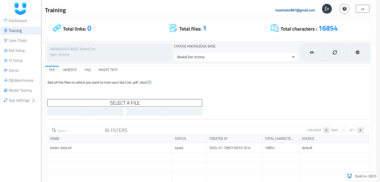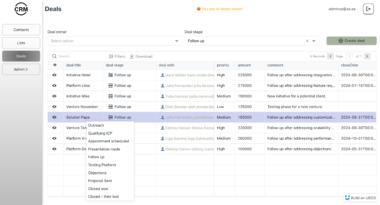UBOS MCP Source Relation Server: Deep Dive into Code Dependency Analysis
In the complex landscape of modern software development, understanding the intricate relationships between different parts of a codebase is paramount. The UBOS MCP Source Relation Server emerges as a powerful tool designed to dissect and visualize these dependencies, offering developers a clearer, more manageable view of their projects. By integrating seamlessly with platforms like Claude, this server empowers AI to rapidly grasp project structures, identify crucial files, and ultimately, enhance the efficiency and accuracy of code understanding.
Unveiling the Core Functionality
The MCP Source Relation Server excels at analyzing source code within a specified directory, meticulously parsing import statements across multiple languages to map out the intricate web of file dependencies. It supports a wide array of languages, including TypeScript/JavaScript, Python, Ruby, and Rust, ensuring broad applicability across diverse projects.
Key features that set this server apart include:
- Multi-Language Support: Handles import parsing for TypeScript/JavaScript (
import,require), Python (import,from ... import), Ruby (require,require_relative), and Rust (mod,use). tsconfig.jsonPath Alias Resolution: Accurately resolves path aliases (e.g.,@/components/...) defined intsconfig.jsonfiles, crucial for modern TypeScript projects.- Language-Specific Nuances: Expertly manages language-specific features such as Python’s
__init__.pyand relative imports, Rust’smod.rspatterns, TypeScript’s aliases andindex.tsconventions, and Ruby’s extension-less requires.
Use Cases: Empowering Developers and AI
The MCP Source Relation Server unlocks a plethora of use cases, dramatically impacting how developers and AI systems interact with codebases:
Enhanced Code Understanding: Developers gain a comprehensive view of project dependencies, enabling faster onboarding, easier debugging, and more informed refactoring decisions. Visualize the impact of changes before they happen.
AI-Powered Code Navigation: When integrated with platforms like Claude, the server provides AI with the context needed to understand project structure, enabling more accurate and relevant code suggestions, explanations, and modifications. No more wandering aimlessly through a vast codebase!
Automated Code Review: Identify potential circular dependencies or overly complex relationships that could lead to maintenance issues. Automate checks for adherence to architectural principles.
Refactoring Assistance: By visualizing dependencies, the server assists in safely and efficiently refactoring code, minimizing the risk of introducing breaking changes. See how changes ripple through your system before you commit.
Knowledge Sharing and Documentation: Automatically generate dependency graphs for project documentation, facilitating knowledge transfer among team members and providing a visual aid for understanding complex systems. Spend less time explaining and more time coding.
Seamless Integration with Claude for Desktop
Integrating the MCP Source Relation Server with Claude for Desktop is straightforward. By adding a configuration entry to claude_desktop_config.json, you enable Claude to leverage the server’s dependency analysis capabilities. The configuration specifies the command to execute (using uv, a fast Python package installer and resolver) and the arguments, including the path to the project directory.
For example:
{ “mcpServers”: { “source-relation”: { “command”: “uv”, “args”: [ “–directory”, “/path/to/mcp-source-relation”, // Replace with the absolute path to your project directory “run”, “source_relation.py” ] } } }
With this configuration in place, Claude can be instructed to analyze the source code dependencies within a specified directory, providing a detailed breakdown of the project’s structure.
Diving Deeper: Example Analysis and Output
Consider a scenario where Claude is instructed to analyze the dependencies of a project located at /Users/owa/GitHub/mcp-source-relation/. The server might return an analysis revealing the following structure:
- Main Analysis Module:
src/source_analyzer.py- orchestrates the analysis process, utilizing language-specific modules. - Language-Specific Modules:
src/analyzers/ruby.py,src/analyzers/python.py,src/analyzers/typescript.py,src/analyzers/rust.py- each responsible for parsing import statements in their respective languages, all inheriting fromsrc/analyzers/base.py. - Common Infrastructure:
src/analyzers/base.py- provides fundamental analysis functions,src/utils/path.py- offers path manipulation utilities,src/configs/typescript.py- contains TypeScript-specific configurations.
This analysis highlights key aspects of the project’s design, such as the consistent architecture across language modules and the centralized handling of path operations. It also pinpoints areas for potential extension, such as adding support for new languages by creating new modules within src/analyzers/.
The server outputs its analysis in a structured JSON format, providing a clear and concise representation of the dependencies:
{ “dependencies”: { “components/Button.tsx”: [ “types/index.ts”, “utils/theme.ts” ], “pages/index.tsx”: [ “components/Button.tsx”, “utils/api.ts” ] } }
All paths are relative to the src directory, ensuring consistency and ease of interpretation.
Comprehensive Support for Import Formats
The MCP Source Relation Server boasts comprehensive support for various import formats across different languages:
- TypeScript/JavaScript:
import { Component } from './Component',import type { Type } from '@/types',import './styles.css',require('./module'), and alias paths (@/components/...). - Python:
import module,from module import name,from .module import name,from ..module import name. - Ruby:
require 'module',require_relative './module', and extension-less requires. - Rust:
mod module;,use crate::module;,use super::module;,use self::module;.
Leveraging UBOS for AI Agent Development
The MCP Source Relation Server perfectly complements the UBOS platform, a full-stack AI Agent development environment. UBOS empowers businesses to orchestrate AI Agents, connect them with enterprise data, and build custom AI Agents using their own LLM models and Multi-Agent Systems. By integrating the MCP Source Relation Server, UBOS-powered AI Agents gain a deeper understanding of the codebases they interact with, enabling more intelligent and context-aware actions.
With UBOS, developers can:
- Orchestrate complex AI Agent workflows: Design sophisticated interactions between multiple AI Agents to solve complex business problems.
- Connect to enterprise data: Seamlessly integrate AI Agents with internal data sources, ensuring they have access to the information they need.
- Build custom AI Agents: Tailor AI Agents to specific business needs using custom LLM models and specialized functionality.
The MCP Source Relation Server, when combined with the UBOS platform, unlocks new possibilities for AI-driven software development, enabling more efficient, intelligent, and reliable code understanding and manipulation.
Source Relation Server
Project Details
- owayo/mcp-source-relation
- MIT License
- Last Updated: 2/24/2025
Recomended MCP Servers

A yara based MCP Server
Manage / Proxy / Secure your MCP Servers


An MCP Server for Ollama
Model Context Protocol Server for NebulaGraph 3.x

A Model Context Protocol (MCP) server for analyzing GitLab repositories and performing security assessments.

 From vibe coding to vibe deployment. UBOS MCP turns ideas into infra with one message.
From vibe coding to vibe deployment. UBOS MCP turns ideas into infra with one message.





